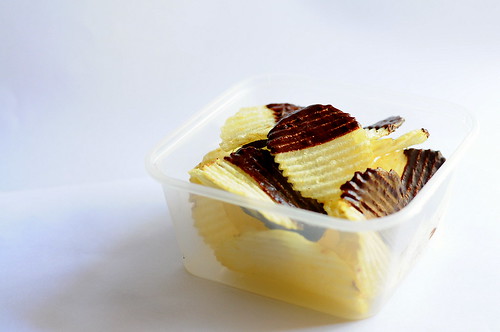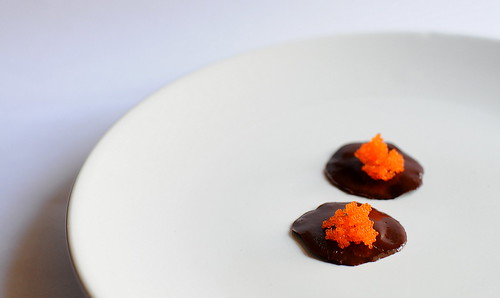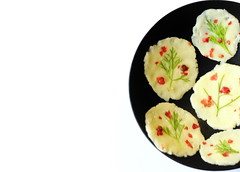Operation Leftover Easter Stuff: Chocolate Experiments in the Physiology of Taste and 2 Samuel 7
So, there is nothing new under the sun.
At a sushi-and-chips dinner (sounds trashy but they're really rather complementary), I started toplay with my food experiment with the resources at hand.
Ridged chips/crisps dipped in dark chocolate = white trash, trailer park grub but as I have been soundly advised, it's all in the marketing. In a gourmet shop, this stuff would be ensconced in pretty tissue, nestled in a pretty box with pretty ribbons, labelled "hand-dipped" and cost you your first-born child.
Taking the theory of the action of salt on statuary from my cultural artifact preservationist days one step further, I put the chips in a hot oven before them dipping in the melted chocolate, on the hypothesis that the air in the salt-created cracks would expand and as the chips cooled and the air in the minute cracks contracted, they would pull in the chocolate. All the better for all-round tastiness.
Say José Miguel Aguilera and David W. Stanley in Microstructural Principles of Food Processing and Engineering far more competently on a not-totally-dissimilar matter:
Intrigued by the complementarity between saltiness and bittersweetness, I dropped some tobikko (salted flying fish roe, とびこ) (I think) onto Guanaja Valrhona dark chocolate. Not bad.
The next day, I told a colleague about my dinnertime experiment. She clutched my arm and her eyes were wild: white chocolate and caviar was the exact same combination she'd had at Ferran Adrià's El Bulli in Spain. A quick google showed that this was a classic molecular gastronomy pairing. In the Guardian, Heston Blumenthal of Fat Duck relates his white chocolate-caviar testimony. He dictates that only real caviar (ie, not my S$6 lumpfish roe and sturgeon caviar wannabe) is to be used but that's probably outside the purview of my stewardship of money.
In any case, was most chuffed. There were others like me! I was not an alien! Good to know because a few weeks back, I'd made chocolate mediants embedded with naked almonds, vodka raisins and crushed pink peppercorn. The pink peppercorns in particular made grown men cry for mercy, women cross themselves and children run into houses and shut the doors behind them. But guess what, it's a very Carlo Ponti-Sophia Lauren MC coupling! I can charge more than the entire shareholding of Bear Stearns for this! Oh wait, that's probably so cheap it'll make grown men cry.[1]
Also tried crushed pink peppercorns with dill from the backyard herb garden on white chocolate. Didn't taste too bad, dill's pretty mild anyway and the peppercorns were more jangly in the white chocolate than in the bittersweet dark chocolate. Have to figure out what to do with the dill though - too chewy in its current state. And the tempering of white chocolate (termed "chocolate" only because of the presence of cocoa butter and not cocoa) obviously remains a great mystery to me. Shall turn to google for rescue.
Jean Anthelme Brillat-Savarin wrote in the very instructive (at least when I was in uni) La Physiologie du Goût that "the discovery of a new dish does more for human happiness than the discovery of a new star". There being nothing new under the sun, I very much doubt that all the classic molecular gastronomical pairings are unique and worthy of patent. 50 goblets of the chocolate + chilli combi, I think, was Montezuma's daily dosage several centuries back.
Even further back than that, David and Nathan were having a bit of a chat one day (2 Samuel 7). This can't be right, said David, my living in plush digs while the Ark of God, the symbol of God's presence, sits in a shabby tent. I'll build a nice house of cedar for it. Go on then, said Nathan the priest. Because, c'mon, who could argue with such piety? (2 Samuel 7:1-3)
Well, God disagreed. Who are you David, came the rhetorical question, that you should build a house for me? God had never asked for such a thing (2 Samuel 7:4-7) God wasn't some work of human hands who was so helpless that he needed to be carried around, showered at regular intervals and built nice houses of high-quality termite-free wood by the very creatures he'd created: he'd made David, a mere shepherd boy, prince over God's people, just as he had promised (2 Samuel 7:8); he gave David victory over his enemies, numerous and powerful as they were (2 Samuel 7:9a). A very powerful God.
And God would to do more. He would make David's name great and give him rest from all his enemies (2 Samuel 7:9b, 11b) and he would establish David's dynasty and kingdom forever (2 Samuel 7:11c-13). And he would give Israel their own land where they could dwell peacefully (2 Samuel 7:10-11a). Neither David nor Israel had done anything to deserve this. This was but a hint of God's undeserved grace to come.
While most promises and contracts have a timeframe, God's promises to David and Israel stretched into perpetuity ("forever" - 2 Samuel 7:13, 16, 19, 24, 26, 29). We know that God had been faithful to his promises thus far but forever was going to be, to put it mildly, a very long time. And from Israel's recent conduct of the Ark and their past dealings with God, everyone could expect that Israel would very quickly fail to be faithful to God. And David too would soon sin in a very spectacular and tabloidy way (2 Samuel 11). Would this disqualify God's promises?
It seems not. God did not impose conditions to his promises, yet he fully expected that both Israel and her king would turn away from him (2 Samuel 7:14-15) and still pledged to keep to his promises. How would God be able to remain faithful to his promises and yet be just and righteous in dealing with sinners as they deserved?
Like molecular gastronomy, God's covenant (contract) with David was not new. It was infact a continuation (yet expansion) of the covenants with Abraham and Moses hundreds of years before: the promises of God's people in God's land under God's rule (see eg. Genesis 12:6-7, Genesis 15, Exodus 19-24).
And like molecular gastronomy too, God's covenant with David was not the be all and end all of revelation. After many more hundreds of years passed, David's descendant Jesus, at once both fully man and fully God, sinless amongst all men, would come deal with the problem of how a righteous God could deal faithfully with sinners who deserved only death: he died in their place so that before God, all who put their faith in him would be attributed his own righteousness. And so Jesus opened the way for the fulfilment of God's promises.
Who are God's people then? And where is the land promised to them?
The land promised to God's people is not that Zionist hotspot in the Middle East. The Book of Hebrews argues that if possession of the physical land of Israel was the fulfilment of God's promise of a resting place for God's people, then David would not have, while king over the nation, spoken of a future rest (Hebrews 4:8). The promised land is the new city in the new heavens and the new earth which will be inaugurated at Jesus' second coming (Hebrews 11:16).
And who are God's people? Not the Israelites or their descendants, the Jews, but those who put their faith in Jesus to save them. The multicultural international nature of God's promises had already been hinted at thousands of years ago when God made a covenant with Abraham (Galatians 3:7-9, 29; Romans 9:6-8).
Coolness indeed.
[1] Good to know also that basic molecular gastronomy is about food hacking and culinary experiments rather than chi-chi expensive places with gold wheelchairs and where flipflops are discouraged!
__________________________________
At a sushi-and-chips dinner (sounds trashy but they're really rather complementary), I started to
Ridged chips/crisps dipped in dark chocolate = white trash, trailer park grub but as I have been soundly advised, it's all in the marketing. In a gourmet shop, this stuff would be ensconced in pretty tissue, nestled in a pretty box with pretty ribbons, labelled "hand-dipped" and cost you your first-born child.
Taking the theory of the action of salt on statuary from my cultural artifact preservationist days one step further, I put the chips in a hot oven before them dipping in the melted chocolate, on the hypothesis that the air in the salt-created cracks would expand and as the chips cooled and the air in the minute cracks contracted, they would pull in the chocolate. All the better for all-round tastiness.
Say José Miguel Aguilera and David W. Stanley in Microstructural Principles of Food Processing and Engineering far more competently on a not-totally-dissimilar matter:
Kinetic data suggests that oil migrates from the surface to the interior of the crust [of the fried potato product] after frying through fine capillary openings in the intercellular spaces, probably by two mechanisms: pressure flow promoted by a vacuum from condensing steam and capillary flow.Coolness.
Intrigued by the complementarity between saltiness and bittersweetness, I dropped some tobikko (salted flying fish roe, とびこ) (I think) onto Guanaja Valrhona dark chocolate. Not bad.
Unevolved prehistoric creatures! Yums.
Then tried Lumpfish caviar on white chocolate. Amazing. The more extreme saltiness and sweetness made for wonderful bedfellows. The trick was to let the white chocolate melt in the mouth before popping the caviar against the teeth, so that both flavours peaked in unison. Having multiple tastes and textures in a mouthful made it far more interesting. Blandness then, isn't a lack of flavour, it's having only one flavour and no contrasting texturezzzzz.The next day, I told a colleague about my dinnertime experiment. She clutched my arm and her eyes were wild: white chocolate and caviar was the exact same combination she'd had at Ferran Adrià's El Bulli in Spain. A quick google showed that this was a classic molecular gastronomy pairing. In the Guardian, Heston Blumenthal of Fat Duck relates his white chocolate-caviar testimony. He dictates that only real caviar (ie, not my S$6 lumpfish roe and sturgeon caviar wannabe) is to be used but that's probably outside the purview of my stewardship of money.
In any case, was most chuffed. There were others like me! I was not an alien! Good to know because a few weeks back, I'd made chocolate mediants embedded with naked almonds, vodka raisins and crushed pink peppercorn. The pink peppercorns in particular made grown men cry for mercy, women cross themselves and children run into houses and shut the doors behind them. But guess what, it's a very Carlo Ponti-Sophia Lauren MC coupling! I can charge more than the entire shareholding of Bear Stearns for this! Oh wait, that's probably so cheap it'll make grown men cry.[1]
Also tried crushed pink peppercorns with dill from the backyard herb garden on white chocolate. Didn't taste too bad, dill's pretty mild anyway and the peppercorns were more jangly in the white chocolate than in the bittersweet dark chocolate. Have to figure out what to do with the dill though - too chewy in its current state. And the tempering of white chocolate (termed "chocolate" only because of the presence of cocoa butter and not cocoa) obviously remains a great mystery to me. Shall turn to google for rescue.
Jean Anthelme Brillat-Savarin wrote in the very instructive (at least when I was in uni) La Physiologie du Goût that "the discovery of a new dish does more for human happiness than the discovery of a new star". There being nothing new under the sun, I very much doubt that all the classic molecular gastronomical pairings are unique and worthy of patent. 50 goblets of the chocolate + chilli combi, I think, was Montezuma's daily dosage several centuries back.
Even further back than that, David and Nathan were having a bit of a chat one day (2 Samuel 7). This can't be right, said David, my living in plush digs while the Ark of God, the symbol of God's presence, sits in a shabby tent. I'll build a nice house of cedar for it. Go on then, said Nathan the priest. Because, c'mon, who could argue with such piety? (2 Samuel 7:1-3)
Well, God disagreed. Who are you David, came the rhetorical question, that you should build a house for me? God had never asked for such a thing (2 Samuel 7:4-7) God wasn't some work of human hands who was so helpless that he needed to be carried around, showered at regular intervals and built nice houses of high-quality termite-free wood by the very creatures he'd created: he'd made David, a mere shepherd boy, prince over God's people, just as he had promised (2 Samuel 7:8); he gave David victory over his enemies, numerous and powerful as they were (2 Samuel 7:9a). A very powerful God.
And God would to do more. He would make David's name great and give him rest from all his enemies (2 Samuel 7:9b, 11b) and he would establish David's dynasty and kingdom forever (2 Samuel 7:11c-13). And he would give Israel their own land where they could dwell peacefully (2 Samuel 7:10-11a). Neither David nor Israel had done anything to deserve this. This was but a hint of God's undeserved grace to come.
While most promises and contracts have a timeframe, God's promises to David and Israel stretched into perpetuity ("forever" - 2 Samuel 7:13, 16, 19, 24, 26, 29). We know that God had been faithful to his promises thus far but forever was going to be, to put it mildly, a very long time. And from Israel's recent conduct of the Ark and their past dealings with God, everyone could expect that Israel would very quickly fail to be faithful to God. And David too would soon sin in a very spectacular and tabloidy way (2 Samuel 11). Would this disqualify God's promises?
It seems not. God did not impose conditions to his promises, yet he fully expected that both Israel and her king would turn away from him (2 Samuel 7:14-15) and still pledged to keep to his promises. How would God be able to remain faithful to his promises and yet be just and righteous in dealing with sinners as they deserved?
Like molecular gastronomy, God's covenant (contract) with David was not new. It was infact a continuation (yet expansion) of the covenants with Abraham and Moses hundreds of years before: the promises of God's people in God's land under God's rule (see eg. Genesis 12:6-7, Genesis 15, Exodus 19-24).
And like molecular gastronomy too, God's covenant with David was not the be all and end all of revelation. After many more hundreds of years passed, David's descendant Jesus, at once both fully man and fully God, sinless amongst all men, would come deal with the problem of how a righteous God could deal faithfully with sinners who deserved only death: he died in their place so that before God, all who put their faith in him would be attributed his own righteousness. And so Jesus opened the way for the fulfilment of God's promises.
Who are God's people then? And where is the land promised to them?
The land promised to God's people is not that Zionist hotspot in the Middle East. The Book of Hebrews argues that if possession of the physical land of Israel was the fulfilment of God's promise of a resting place for God's people, then David would not have, while king over the nation, spoken of a future rest (Hebrews 4:8). The promised land is the new city in the new heavens and the new earth which will be inaugurated at Jesus' second coming (Hebrews 11:16).
And who are God's people? Not the Israelites or their descendants, the Jews, but those who put their faith in Jesus to save them. The multicultural international nature of God's promises had already been hinted at thousands of years ago when God made a covenant with Abraham (Galatians 3:7-9, 29; Romans 9:6-8).
Coolness indeed.
[1] Good to know also that basic molecular gastronomy is about food hacking and culinary experiments rather than chi-chi expensive places with gold wheelchairs and where flipflops are discouraged!
__________________________________
- The Myanmar-Sichuan Double Disasters, Ironman and Watchmen, and 2 Samuel 21 - 24
- Dead Dogs, Dead Cows and Dead Men in 2 Samuel 19 - 20
- Chek Jawa, the 37.96km Ride Along the Eastern Coastal Park Connector etc and 2 Samuel 14 - 18
- Inevitabilities, Boat Asia, Strawberries, 五月天 (wuyuetian, MayDay)'s 回到地球表面 (Down To Earth) Concert and 2 Samuel 12
- Black Forest Gateaux Cupcake Experiments and the Dosh on David in 2 Samuel 11
- The Covalent Bonds of Cake-baking and the Covenantal Bonds of 2 Samuel 8-10
- The Return of Sunshine and the Return of the Ark in 2 Samuel 6
- Operation Leftover Easter Stuff: Reconstructed Deconstructed Lemon Meringue Tart and 2 Samuel 1 - 4
Labels: 2 Samuel, All Given For Food: Chocolate, All Given For Food: Kitchen Experiments that apparently approximate "Molecular Gastronomy"












2 Comments:
i've had choc-covered chips from royce! wrapped in a slightly more atas chips packet.
(eh, can i have some food from your kitchen, esp if they involve valrhona chocolate of any sort? =D)
sure! you'd better sign indemnity form first though. :-p
Post a Comment
Subscribe to Post Comments [Atom]
<< Home